Comments
ANIMAL WATCH - Wild turkeys, increasingly seen in residential and commercial areas across the U.S. are becoming the Pit Bulls of the poultry world—attacking even humans who feed them without warning, and stimulated to aggression by just seeing their own reflection on a window or a recently waxed vehicle and perceiving it as a competitor for mating or food, which does not retreat but continues to move closer and “fight back” with each mirrored peck, until a change in lighting causes it to vanish according to turkey-behavioral experts.
Applying this persistence to an attack on a human perceived as a threat explains the wisdom of why law-enforcement and wildlife officers avoid confrontations with turkeys whenever possible. They also warn about the danger of attracting these birds to residential communities with families, where windows and many other shiny, reflective objects—including large toys—can be interpreted by a male turkey as invasion of its territory.
Wild turkeys were not intended to live in areas populated by humans, and are constantly bumping into laws forbidding trespass, vandalizing yards, bullying and attacking residents and law-enforcement officers, and acting out a special vengeance on U.S. Postal Service mail carriers and other delivery personnel who return regularly after being chased away and warned by the bird that they are “not welcome.”
They are quickly slipping from their branding by Benjamin Franklin in 1784 as the “Bird of Courage,” to marauders in communities, and, according to WION, earning their reputation of being “bad-tempered neighbors.”
DON’T FEED THE BIRDS!
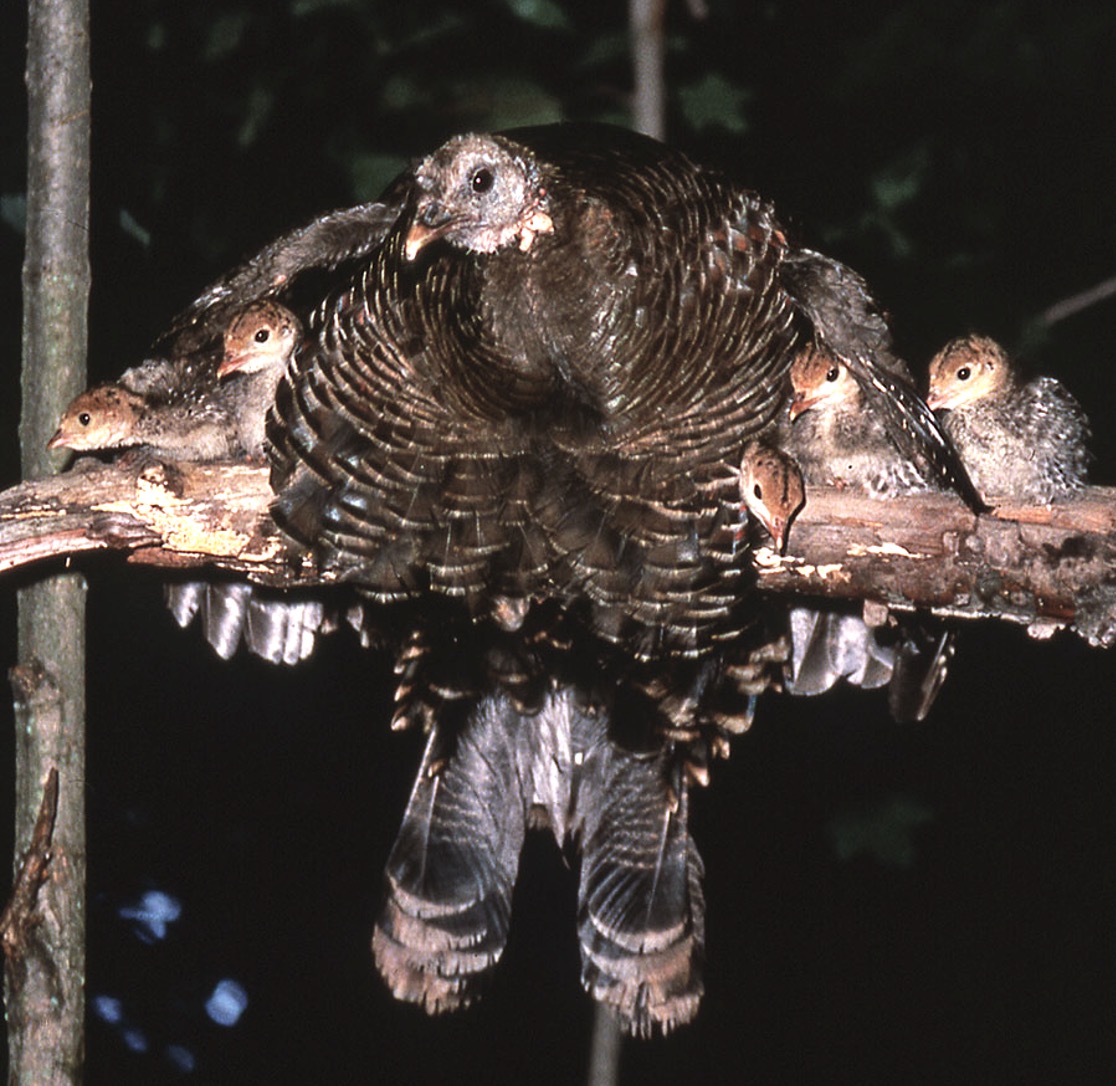
Experts warn that humans wanting to make turkeys feel welcome (until they become Thanksgiving dinner) provide resources that the birds perceive can be taken away, including food.
This is not kindness in that it causes the turkey to expect to be fed, and frustrated and angry when it is not. It also changes the social positioning by making the bird an equal or even (in its perception) dominant. Once it loses its fear, it begins to expect food when it sees a human and insistent to the point of aggression when that is not forthcoming.
The most frequent stimulus causing a turkey attack, according to officials, is—not surprisingly—a male’s perception of competition for food and mating.
Females defend against loss of resources to raise offspring.
A touching depiction of a female turkey’s devotion to her babies appears in “A Mother Turkey and her Young—Their Kind and Careful Parent,” Katherine Davis, Phd., writes, “Young turkeys need their mothers. Unlike baby songbirds and raptors, whose parents are absent for long periods gathering food to take back to their young in the nest, it is unnatural for young ground-nesting birds such as turkeys and chickens to be separated from their parent. The mother turkey is the center of the young birds’ universe.”
“During the first month when the young require brooding – being sheltered under the mother bird’s wings at night and periodically gathered beneath her wings for warmth and comfort during the day – the youngsters, called “poults,” will panic if separated from their mother. The terrified baby turkey gives out a “lost call” to which the mother bird responds by running towards her little one, crouching and gathering him comfortingly under her wing.”
All of these factors make it understandable why experts warn against creating a comfort level by feeding any wild animal and not encouraging turkeys to enter and roost in residential areas where they may feel challenged by family activities or by a child.
HOW SERIOUS A PROBLEM ARE WILD TURKEYS?

Law-enforcement is usually not notified about a human altercation with a turkey until the turkey is winning, but from New Hampshire to California reports cite incidents of conflict.
According to a November 18, 2022, report by the National Wild Turkey Association, “Turkey biologists estimated 4,966,127 to 5,001,127 wild turkeys across the species range in those states that reported data for both 2014 and 2019.” (See report here.)
“Wild turkeys are back, but some people aren’t too happy about sharing their neighborhoods with them. “People have reported turkeys chasing them, attacking their cars, trashing their yards.”
“You might even call them Public Enemy No. 1.”
But they’re not going anywhere,” wrote Chris Jordan of the Ashbury Park Press (NJ).
WILD TURKEYS MAKE UP THEIR OWN RULES

Turkeys made headlines around Thanksgiving time in 2019 when residents of Holiday City and other parts of Toms River in New Jersey weren’t happy with their arrival.
Pro baseball player Todd Frazier was among the haters, the report stated:
“They have come close to harming my family and friends, ruined my cars, trashed my yard and much more ...,” Frazier tweeted.
TOUGH TURKEY IGNORES ARROW THROUGH ITS BREAST
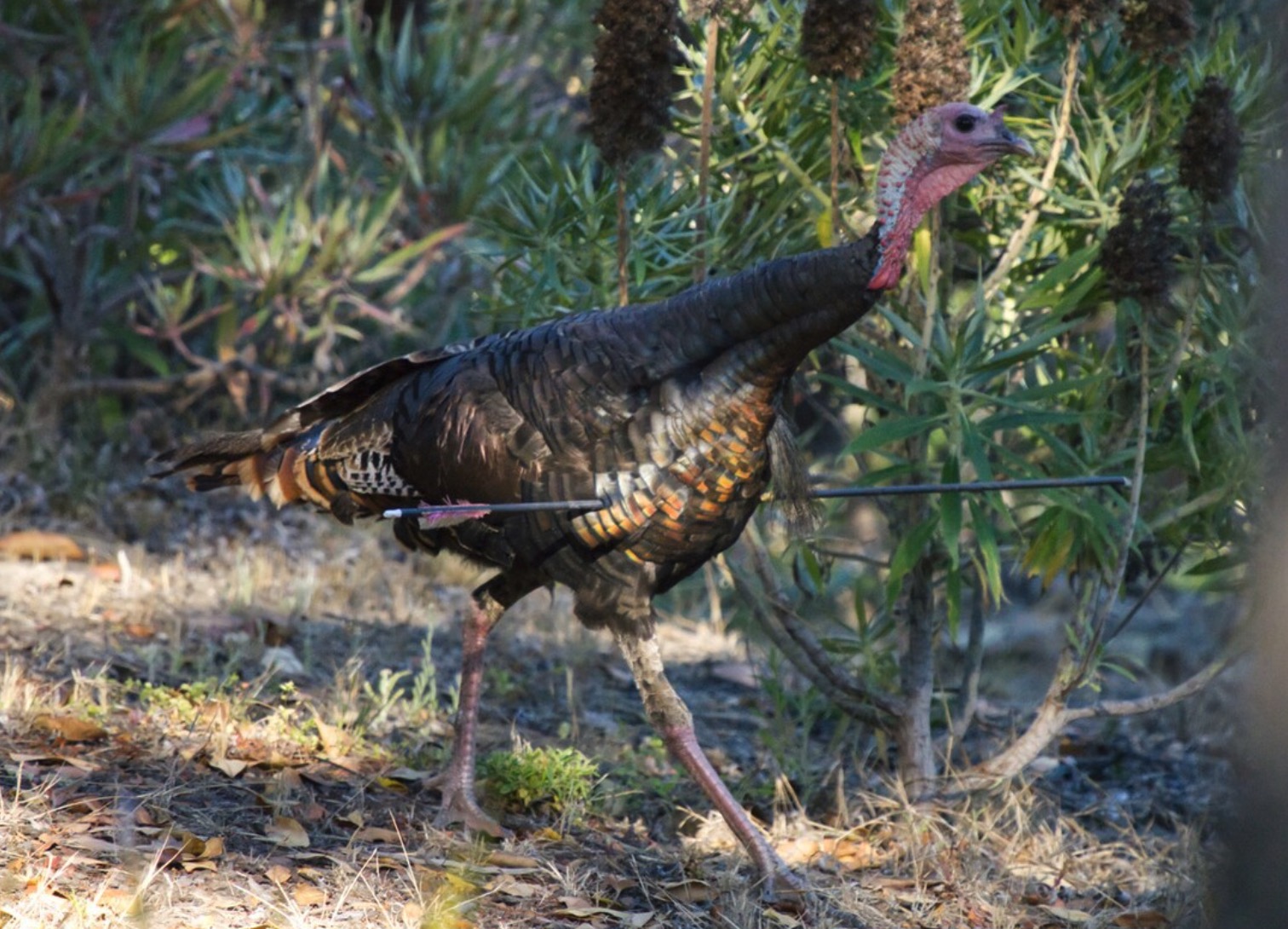
A Turkey with an arrow through its chest was reported by the Sacramento Bee on August 16, 2023, and she was named “Cupid.”
Photos showed the seemingly otherwise healthy turkey roaming the Monterra area in Monterey County, CA. A video on YouTube more than six months before, recorded its first sighting.
A spokesperson for the SPCA Monterey County said that they have been monitoring every report on Cupid and that she seems to be navigating well, so the organization made a decision that it might be more hazardous to capture her and confine her than to allow her to continue roaming in the wild, since all reports on her activities have been positive.
TOO MUCH KINDNESS CAN BE A PROBLEM FOR WILDLIFE
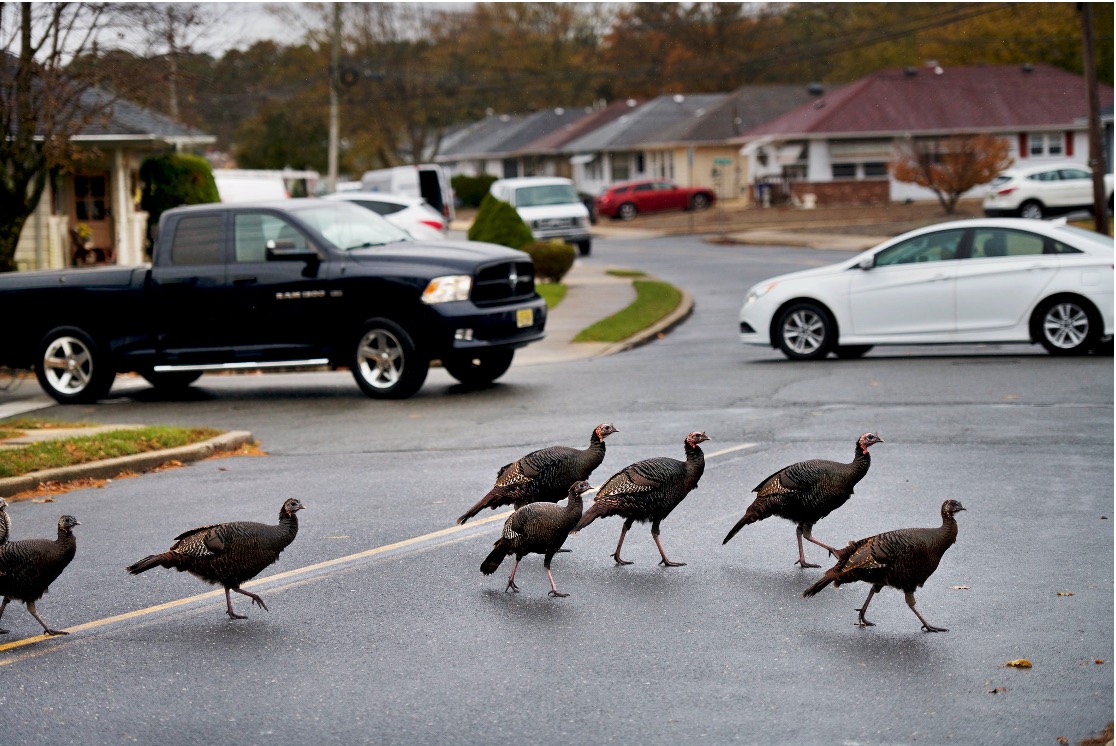
Experts say that much of the problem of turkeys in conflict with humans is due to the misplaced kindness of strangers, who put out food and water for them, causing them to multiply at a faster rate and become resentful of any perceived intruder—including the residents.
As if the rise in invasive crimes by humans in CA is not enough, entire neighborhoods are being taken over by marauding bands of these large and dangerous and aggressive birds,” said one Northern CA resident.
Other problems are the altercations between police, wildlife, animal control and other law-enforcement officers, and a growing resentment by the turkeys of those who dare to enter to make daily or frequent deliveries after receiving a warning; such as, USPS mail carriers and others who return on a regular basis.
However, with the increase in incidents such as attacks on police cars, it is obvious this is not going to end well for the turkeys either.
Aggressive turkey attacks CA police officer’s patrol car
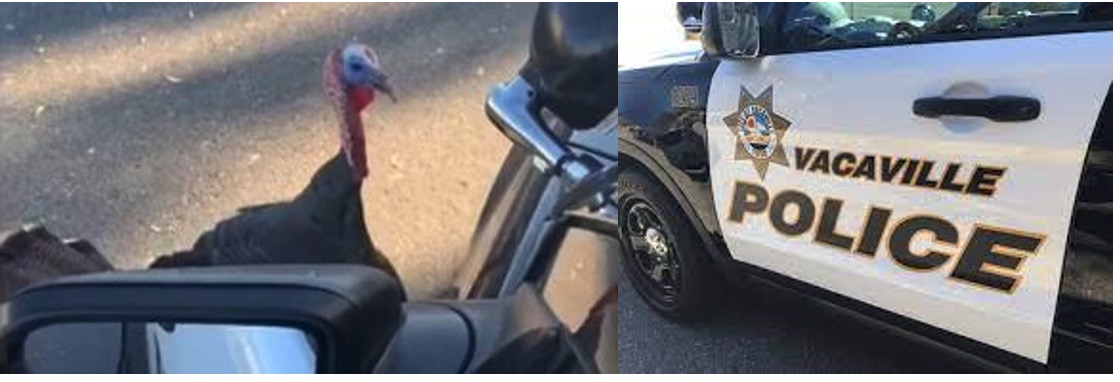
On July 25, 2022, KTVU reported:
“Aggressive turkey attacks Vacaville resident, then stalks patrol officer”
An aggressive turkey forced a Vacaville resident to call for police early Sunday morning near the County airport, where she was being stalked and threatened by an aggressive turkey.
When the officer arrived to help, the wild bird began terrorizing the patrol car. The officer’s video shows the turkey hitting and pecking the side of the patrol car. So, after determining that no human was endangered, the officer decided to just “retreat and drive away to deescalate the situation.”
The officer did take the time to give the turkey a nickname: ‘Vacavilloceraptor.’
He also shared advice if others are ever in a similar situation with an aggressive bird.
“Stay in your vehicle, they haven’t figured out door handles yet,” the officer said. “Also, consider safely driving away, they can only run up to 25mph.”
The report stated that Solano County Sheriff’s office was advised of the turkey’s behavior as it is in their jurisdiction.
Aggressive “Miss Turkey” Arrested
On November 5, 2020, CNN reported, that, “A particularly aggressive and disruptive turkey had to be relocated by officers in Roseville, California, after numerous reports by residents.”
“One person even reported that they couldn’t leave for work because the turkey was being so aggressive,” according to the KOVR report.
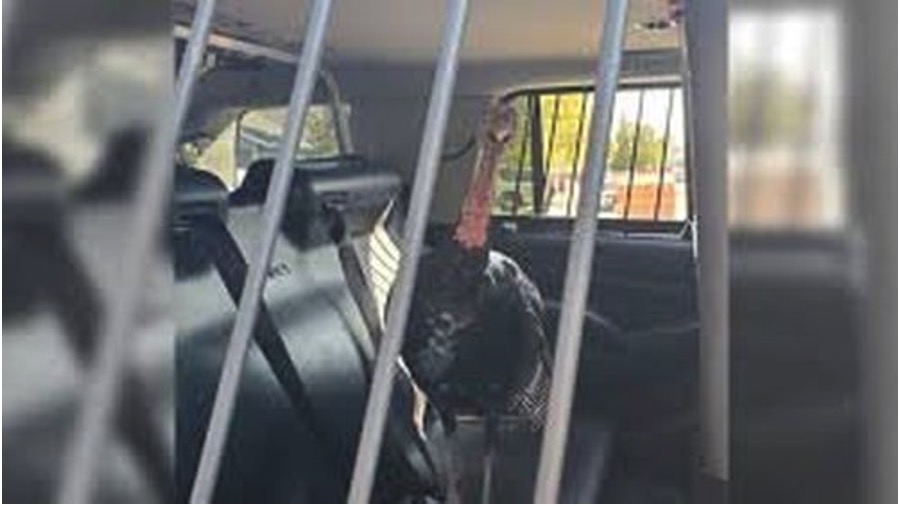 (KOVR)
(KOVR)
(Photo of Miss Turkey being transported in patrol car.)
Because animal control officers were out on other calls, the job of arresting the invading bird fell on two Roseville police officers, who responded and were soon greeted by “Miss Turkey.”
After wrestling the large and uncooperative lady into the back seat of a police cruiser, officers decided that incarceration could create even further problems and they relocated Miss Turkey to a nearby wooded area where there was a flock of wild birds.
Tough Turkey Arrested After Attacking Wildlife Officer

Wildlife Officer Nathan Cass met a tough turkey last year that thought it could bully the neighborhood without interference from Johnny Law. But like every other troublemaker in the state, the bird-turned-attacker was put behind bars and detained, the Mansfield News Journal reported.
The Ohio Department of Natural Resources Wildlife officer said Ohioans might start to see similar outlaws in their own lawns as the days get longer and warmer.
“It’s a behavior that’s caused by people putting out bird seed and whatnot,” Cass said. “Those birds are just habituated to being around people.”
He Took Off Running Right Toward My Truck
The Crawford County wildlife officer encountered the angry turkey last year near Fremont after helping patrol the walleye run in the Sandusky and Maumee rivers, according to the report.
Cass said that this turkey’s reputation had preceded him, with “complaints of aggressive turkeys running around ... chasing vehicles and going after kids as they were waiting for the school bus.”
Outside of Fremont, he said he noticed a male turkey with a flock of hens. “He was in full strut,” Cass said. “and they were over by a bird feeder in someone’s front yard.”
The wildlife officer stopped to see how the birds would react, and he quickly found out. “He took off running right toward my truck,” Cass said. “Next thing I know, he’s starting to peck at it.” The officer wanted to protect his truck, but he also knew he could be scratched.
Then the large male turkey “started jumping and flapping his wings, kind of trying to spur me with his spurs on his legs,” Cass said. “It kind of took me for a surprise.”
Since the tough bird was playing “rough,” he decided it was necessary to “make an arrest.” So, he said he got a fishing net out of the back of his truck and was able to get it over the turkey and move him into a carrier.
Once the turkey was caged and in the truck, he drove it about 10 miles outside of Fremont to a woods.
“When I opened the crate, obviously I didn't know if he was still going to be mad at me or what he was going to do,” Cass said. “But I opened the crate and he wanted nothing to do with me at that point. He took off flying.”
“I guess it is fairly common in urban areas where people have bird feeders out,” Cass said. “Like any wild animal, they can get habituated to people, lose the fear of people ... and you have these human-wildlife interactions that don’t always go so well.”
INJURIES CAN OCCUR – Advice From An Expert
“If someone does find themselves scuffling with a wild turkey, their best course of action will be to avoid being scratched by the spurs on the bird’s feet,” the report states.
“Most of the time when people get injured by these larger birds like that, it’s because they trip and fall as they’re trying to run away,” Cass warned.
The wildlife officer suggests the humans back away if they are attacked by a turkey.
“Try not to panic and just kind of give the turkey some distance,” Cass said.
“Stop putting bird feed out for a little bit and let that turkey kind of go on its way,” Cass said. “If you're continuously putting that food source out there, they will come back.”
THE TAKE-AWAY REGARDING “TOUGH BIRDS”
Don’t feed wildlife, including turkeys.
Keep a safe distance from any wildlife and don’t encourage it to move in to your yard.
Report any injured or wild animals immediately to your local animal control agency/public health department.
Not placing wildlife, including wild turkeys, in a situation where it tries to escape or could put itself—or you—in harms way can keep even the toughest bird from ending up behind bars.
(Phyllis M. Daugherty is a former Los Angeles City employee, an animal activist and a contributor to CityWatch.)





